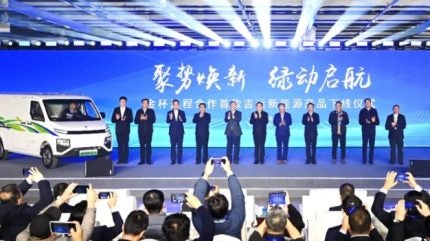
Chinese automaker Shenyang Jinbei Automotive Company Ltd this week began production of two new energy vehicle (NEV) models at one of its assembly lines in Shenyang, in China’s northern Liaoning province.
The Jiyun E6 and Jiyun E9 commercial vans that rolled off the production line last week are the first models to have been developed in collaboration with Geely Holding Group’s commercial vehicle unit Farizon Auto.

Discover B2B Marketing That Performs
Combine business intelligence and editorial excellence to reach engaged professionals across 36 leading media platforms.
The two companies confirmed they plan to launch a range of methanol-hydrogen hybrid electric vehicles in 2025, with the aim of increasing the adoption of new energy commercial vehicles in China’s colder regions. They pointed out that freezing winter temperatures reduces battery efficiency and limits the range of battery electric vehicles. This has hindered the adoption of NEVs in the northern regions of China, where the penetration rate is below 2% in 2023 – well below the national average.
Speaking at the launch ceremony last week Geely Holding Group’s chairman, Li Shufu, hailed the collaboration between the two companies by saying: “Together, we aim to create a green methanol ecosystem and empower Liaoning with a new productive force.”
Geely said it has already carried out research and development (R&D) into methanol as a fuel for two decades and that it has so far put into operation almost 40,000 methanol-powered vehicles worldwide.
The company confirmed that the first methanol refueling station is already operational in Shenyang, with 40 more outlets to be rolled out by 2026, to form the basis of a methanol-hydrogen ecosystem.






